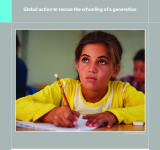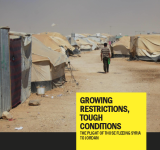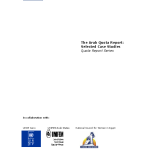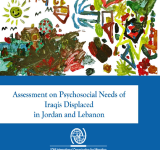لبنان
The report assesses the practical challenges of education and schooling for the Syrian children in refugee camps in Jordan;; Lebanon and Egypt as the Syrian Crisis prolongs. It argues that ensuring the continued access to learning is an essential platform for protection;; social stabilization and economic recovery that the international community should not ignore. The report also includes important figures and statistics revealing the alarming situation of education and school. Some of the key statistics are the host-country school-age children compared to Syrian school-age children;; Syrian children enrolled in public schools in Lebanon and Jordan and school-age Syrian refugee children in and out of school by countries such as Iraq;; Egypt;; Turkey;; Jordan and Lebanon. The report concludes with four key recommendations to be undertaken by regional governments and their international partners so that the fundamental right to quality education can be guaranteed to the Syrian children.
أُجري هذا التقرير على مدار أربعة أشهر في لبنان والأردن;; ويركز على التحديات المؤلمة التي تواجه أطفال اللاجئين السوريين كل يوم. والهدف من هذا التقرير هو إعداد تقرير قائم على الأدلة من زاوية إنسانية;; تستهدف قاعدة عريضة من الجماهير لرفع الوعي بشأن التحديات التي تواجه حماية الأطفال;; وإعطاء فكرة عن كيفية استجابة وكالة الأمم المتحدة وشركائها;; وتسليط الضوء على بعض الفجوات التي تتطلب اهتماماً عاجلاً من جانب المجتمع الدولي. وتم اعتماد منهجية تتألف من مراجعة مكتبية للتقارير والتقييمات القائمة;; إلى جانب جمع البيانات وإجراء بحث ميداني في كل من المواقع الحضرية والريفية وفي المخيمات. وقد تم جمع المعلومات من خلال مناقشات مجموعة التركيز والمقابلات التي أجريت مع الأطفال اللاجئين وعائلاتهم;; إلى جانب اللاجئين العاملين مع الأطفال داخل مجتمعاتهم وموظفي المفوضية وغيرها من المنظمات العاملة مع الأطفال اللاجئين.
يستند مضمون هذا التقرير المتعلق بالأردن إلى حد كبير إلى زيارة بحثية قامت بها منظمة العفو الدولية إلى البلاد في يونيو/حزيران 2013. وقد التقى وفد المنظمة بممثلي السلطات الأردنية ووكالات الأمم المتحدة والوكالات الإنسانية الدولية والمنظمات غير الحكومية والجمعيات الخيرية;; فضلاً عن أكثر من 150 لاجئاً من سوريا في مجتمعات اللجوء والمجتمعات المضيفة. ونشرت منظمة العفو الدولية هذا التقرير بهدف لفت الانتباه إلى الصعوبات التي يواجهها الفارون من سوريا طلباً للسلامة. وفي الوقت الذي يركز فيه التقرير بشكل رئييس على الأوضاع في الأردن;; فإنه يتضمن تحديثا للمعلومات التي كانت المنظمة قد نشرتها في السابق بشأن التحديات التي يواجهها اللالجئون من سوريا في البلدان المجاورة. وقد أمعنت منظمة العفو الدولية النظر في التحديات التي يواجهها اللاجئون في الأردن;; ولا سيما أولئك الذين يقطنون في مخيم الزعتري;; وهو أضخم مخيمات اللاجئين من سوريا في الأردن. وأجرت المنظمة تحقيقاً حول معاناة اللاجئين;; ليس من ظروف المعيشة القاسية في الصحراء فحسب;; وإنما أيضاً من ارتفاع معدلات الجريمة وغيرها من المخاوف الأمنية.
This report was compiled from the findings and case studies presented at a workshop held on 5-6 December 2004;; in Cairo Egypt. This report contains an overview on global trends and regional analyses;; implementing legislated quotas for women;; quota adopted by political parties;; methods on enhance women’s participation;; and the role of the international community and international instruments. The international IDEA had convened a series of regional workshops to gather qualitative data. The report also has 6 case studies about women’s participation and quota include comparative experiences with quotas;; address the culture challenges to women’s representation in the Arab world;; and point the opportunities that could be seized in order to meet those challenges.
This report is an assessment on the psychosocial needs of Iraqis displaced in Jordan and Lebanon. The assessment included mapping;; structured interviews with stakeholders and 200 families;; and direct observations through an innovative methodology based on Hertz’s migration paradigms with a non medical focus. The results highlighted the necessity for psychosocial interventions;; since most families were rebounding in their experience of displacement;; and the challenges posed to service providers by the first massive urban displacement crisis.




